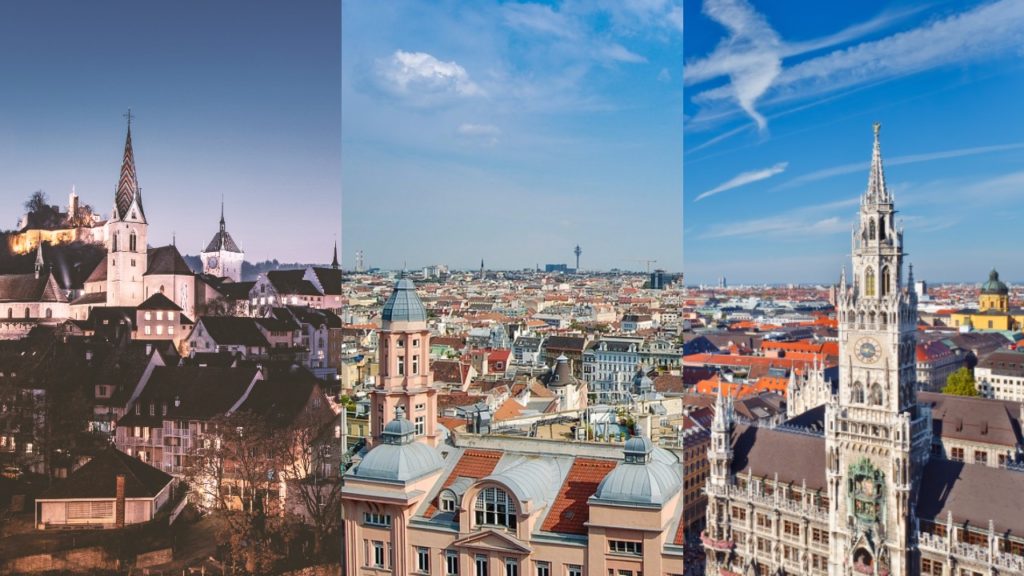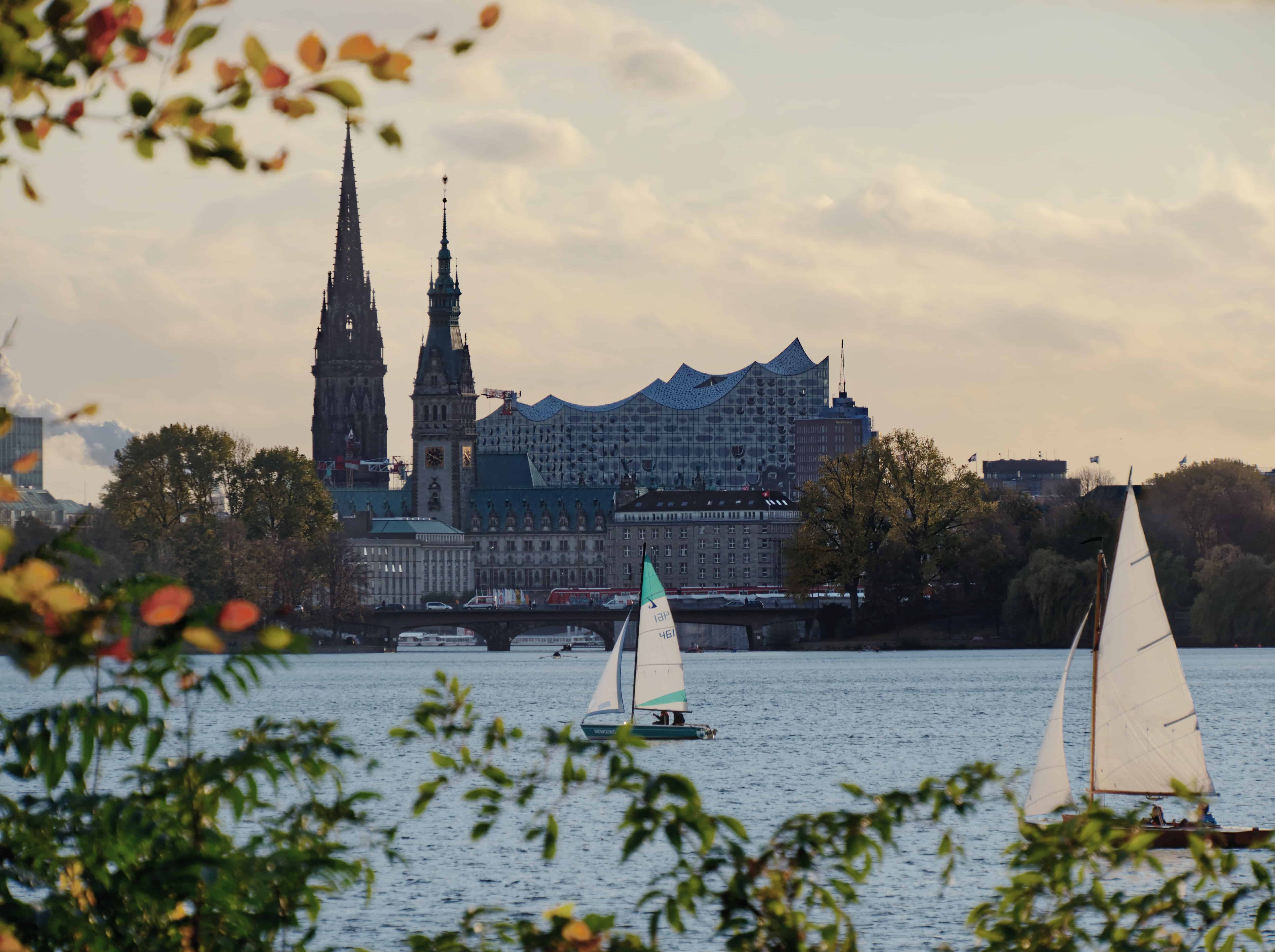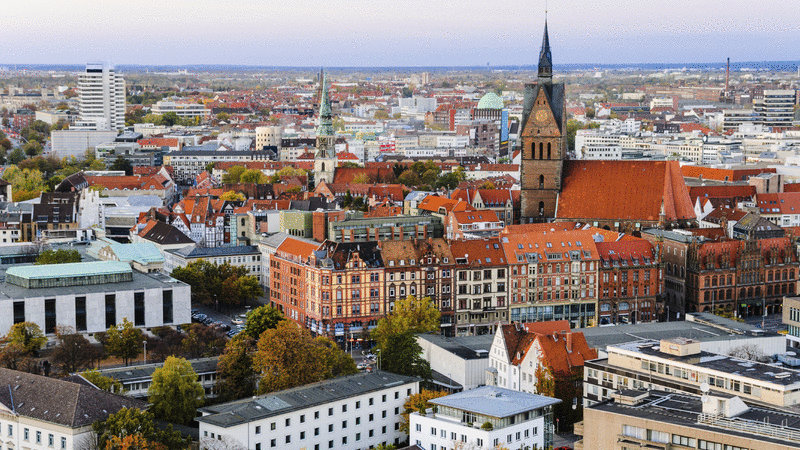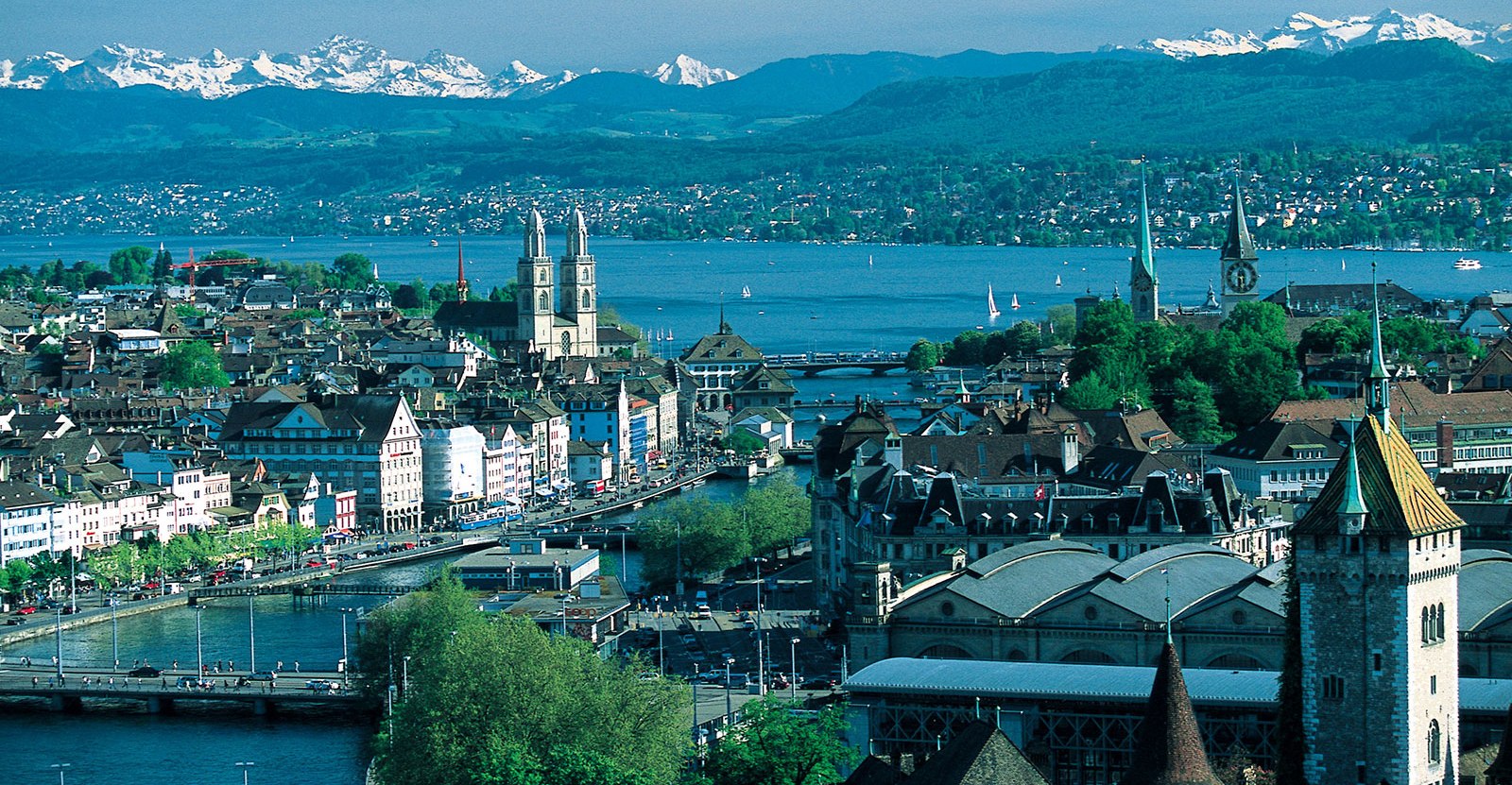
The Best City to Learn German: 10 Great Places to Learn Authentic Deutsch on the Ground
Are you thinking of learning German in a German-speaking environment? Well, this is the post for you then.
In this post, I’ll tell you what you need to do and prepare in order to study in a German-speaking country, and I’ll go over the 10 great cities to choose from for your German learning adventure.
Contents
Download: This blog post is available as a convenient and portable PDF that you can take anywhere. Click here to get a copy. (Download)
The Best Cities to Learn Authentic German In
1. Berlin, Germany
A modern, multicultural city that’s a student’s dream
Advantages: Nightlife, theater and dance, Germany’s capital has it all in terms of culture.
Disadvantages: Most Berliners speak English, so they’ll often switch to it when they hear you struggling.
The first time I went to Berlin nearly 20 years ago, I vowed to one day live there, even if only for a few months. Flash forward to 2016, when I just completed 10 years of living in Berlin.
The only problem is that I live in Berlín, Costa Rica, a small coffee-farming community of a few hundred people on the top of a mountain in the Costa Rican Central Valley. So that didn’t quite go as planned, but my affinity for the other Berlin lives on to this day.
After the Berlin Wall came down in 1989, Berlin quickly became a bustling epicenter of all kinds of activity and change. In 2003, the mayor of Berlin somewhat famously described the city as “poor but sexy,” as the city was drawing many young people and outsiders looking for a different way of life.
That may have changed a bit lately, especially the “poor” part. Rents and costs have certainly gone up in the years since the Wall fell, but there are still parts of the city that are relatively cheap when compared to other parts of Germany, and especially when compared to other European or international cities.
Nevertheless, it’s still an incredibly lively place with countless indoor and outdoor activities, with technological jobs, fashionable stores, hot clubs and chilled-out cafes, all of which make it a student’s paradise. Even if you’re not a student, the city’s dizzying array of museums and countless cultural activities—many of them free—provide edification and entertainment for people of any age.
Personally, I was happily surprised by the huge and excellent Deutsches Technikmuseum (German Technology Museum), but my favorite museum is the DDR Museum, which lets you get a hands-on feeling of what things were like when Berlin was a divided city within a divided country.
If that piques your interest and makes you want to learn more about the history of divided Berlin, other great museums include the open-air East Side Gallery, which is a remaining section of the Berlin Wall, the Stasi Museum, which is all about East Germany’s secret police, and the Checkpoint Charlie Museum, which is located on the former border crossing point, and which highlights stories of people who tried to escape East Germany.
For other cultural activities, nothing beats the (free) view from the dome of the Reichstagsgebäude, Germany’s parliament building. Just be sure to make a reservation ahead of time. A five-minute walk from there is the famous Memorial to the Murdered Jews of Europe, a somber place for reflection, as well as the Tiergarten, a gigantic urban park.
If you’re more into traditional museums, Berlin has the Museuminsel (Museum Island), a UNESCO World Heritage Site that’s home to five famous museums, including the Pergamon Museum. Finally, if that’s too highbrow for you, you can always check out the Deutsches Currywurst Museum (German Curry Sausage Museum), which is dedicated to one of Germany’s favorite snacks!
Berlin has the Humboldt University and the Freie Universität, two of Germany’s best world-class universities.
Another one of the city’s major selling points is its diversity. Roughly 20% of people living in Berlin were both in another country. That number rises to nearly one in three people (article in German) if you include those with a “migration background,” which are those people who have at least one parent born in another country.
All of that means that it’s easier to find German language courses and, when you get tired of conjugating your verbs and cramming new German vocabulary into your brain, it’ll also likely be easier to find people with a similar background to yours if you feel like taking a break and reminiscing about things back home.
2. Munich, Germany
Everyone’s mental picture of Germany
Advantages: Beer gardens, beautiful parks, nearby mountains and great food.
Disadvantages: It’s very German, so if that beer-drinking culture isn’t for you, you may become tired of it.
Yes, I realize that the first two places on the list, including this one, are two places that most tourists hit up when going to Germany. But there’s a reason for that: Berlin and Munich are two iconic tourism destinations, but they’re also great for locals!
Munich offers a lot of the same selling points that you’ll find in Berlin, including multiple schools—including Berlitz and Goethe Institut—a full network of opportunities through the Volkshochschule, and all of the advantages of living in a modern, exciting, cosmopolitan city.
But whereas Berlin looks like a city from the future crash-landed on a city from the past, Munich looks like the physical manifestation of countless stereotypes about Germany.
Magnificent churches with the Alps just around the corner? Check. A glockenspiel in the middle of the city hall tower? Check. Sausages and sauerkraut? Check. Lederhosen and dirndls worn non-ironically? Check. Enough beer to drown a team of horses? You’d better believe that’s a check. All of these elements add up to one thing: Munich just feels German.
There are tons of possibilities to learn German while living the good life and experiencing German culture. If you’re into museums, the Deutsches Museum is one of the most famous in all of Germany.
If you like parks, the Englischer Garten has wide fields, a refreshing creek where sunbathers can cool off or even surf, a Chinese tower and multiple beer gardens.
If you’re a gearhead, Munich is home to BMW, whose BMW World is a must-see for car fans.
And for sports fans, you can visit the site of the Munich Olympics or the new(ish) Allianz Arena, home to the Bayern München soccer team.
Munich’s most famous “tourist attraction” is their beer. And about that beer: Munich’s roughly 100 beer gardens can bring a wistful tear to any beer lover’s eye, and you really must go to Oktoberfest if you’re in the country in September or October, even if you’re a teetotaler. It’s still lots of fun for all ages, which makes it high on many a “bucket list” throughout the world.
Munich’s location in Bavaria in southern Germany also gives it a leg up on other cities, since it’s so close to the Alps and several central and southern European countries. Plus, the weather in the south tends to be warmer and sunnier than in the dreary, rainy north!
As we’ve already seen, there are lots of places where you can learn German, but if you’re interested in learning something else while perfecting your German, Munich is home to the Technische Universität München (Technical University Munich, abbreviated TUM). The TUM has been ranked multiple times as the number one university in Germany, and its approximately 37,000 students can study any number of subjects.
And if that’s not enough for you, Munich also boasts another top 10 German university, the Ludwig Maximilian University Munich. That institute has over 50,000 students, and over 7,000 of them are international.
In terms of learning German, the one drawback of Munich may be the Bavarian dialect. There are some regional vocabulary words that you’ll have to pick up on, but it’s usually no big deal. For example, the biggest one I noticed immediately was that a small bread roll, normally called a Brötchen in the north, is called a Semmel in the south.
It’s normally not written, but people speak it everywhere. However, if a Münchner (a person from Munich) notices that you’re from the north of Germany or another country, they’ll often speak standard German so that you can communicate.
3. Heidelberg, Germany
A smaller city with a long tradition of education
Advantages: Historic university town with a dose of castles.
Disadvantages: It’s a little small, so if you’re not a student, there’s not that much to do.
Here’s another German city with an excellent university. In fact, the Heidelberg University, also known as Ruprecht Karl University, is the oldest university in Germany, having been founded in 1386!
And like Berlin and Munich (and nearly any mid-sized or larger German city), Heidelberg also has classes through the Volkshochschule and other language schools like Berlitz or F+U, the latter of which can even include student housing.
Heidelberg is also a beautiful city in a great location. The ruins of Heidelberg Palace are a tourism and photography mainstay, giving visitors great views of the city. Just be sure to time your stay (or visit to the castle) to avoid tourists.
The city is just a short train ride away from many western and southern German cities like Cologne, Frankfurt and Stuttgart, and it’s also tantalizingly close to France, Luxembourg and Belgium. Sounds like you’d have quite a few options for a weekend getaway, right?
Perhaps the biggest advantage of Heidelberg is that it’s not a huge, cosmopolitan city. It does have a good student scene and there are many restaurants and bars for locals and the many tourists who visit the city. On the whole, it’s quite a bit more laid-back than the larger cities on this list.
4. Hannover, Germany
Yes, Hannover
Advantages: Easy pace of life and very nice people.
Disadvantages: Not the most exciting German city and lacking tourist hotspots.
First of all, let’s get this out of the way right now: This city’s name is spelled with 2 N’s in German. But you know what they say, right? Double the N’s, double the fun!
You often hear people say, “Such and such a place is really nice to visit, but I could never live there.” Well, Hannover is basically that same phrase, only inverted. It’s the proverbial “boring to visit, but great to live in” type of city.
Seriously, though, Hannover is nice, but it almost never shows up on anyone’s radar if they’re from outside of Germany.
I heard of Hannover for the first time when I learned that I’d be spending a year as an exchange student in a city about an hour outside of Hannover. I’m pretty sure my first thought was, “Wait, where?” which was then followed by a search for a map (we didn’t have the internet back then). But for whatever reason, hardly anyone goes to Hannover for tourism, and that’s a shame.
However, that shame can work to your advantage, since this undiscovered gem is possibly the ideal place to learn German. And I mean that linguistically.
Whether it’s true or not, Hannover is well-known among German speakers and learners for having das reinste Deutsch (the purest/cleanest German). To immediately clarify that, they mean that the German spoken in Hannover is as close as you’ll get to the “standard” German you’ll hear on the listening tracks from textbooks.
Hannover has a lot of other cool things, too. Like the other cities, there are several language schools like Berlitz and ISK, and Hannover also has a Volkshochschule system. Hannover’s Leibnitz University is also very well-regarded if you’re looking for a university education.
The city also boasts lifestyle perks that you might not find in larger or smaller cities. Its position right in the middle of Germany, both in terms of population size and geography, makes Hannover a place that has plenty of things to do and see, but which also makes it really easy to relax or escape from the city for a weekend.
If you do stay in town, the Neues Rathaus (“new city hall,” which is actually over 100 years old) is a good starting point for a scenic day. You can ride in a unique curved elevator to the top of the town hall’s cupola, which will give you a scenic outlook on the entire city.
You can’t miss the Maschsee, a giant urban lake right around the corner from the town hall. People go there all year round to hang out, exercise, drink beer, eat ice cream and just enjoy the great outdoors. They especially go there during the Maschsee Lake Festival, a multi-week outdoor party held every August.
5. Hamburg, Germany

Cosmopolitan port city with a unique way of saying “hello”
Advantages: Lots going on and a vibrant lifestyle.
Disadvantages: Hamburgers can be insular and a bit snobby.
Studying German in Hamburg offers a vibrant and immersive language learning experience amidst the rich cultural tapestry of this dynamic city.
The cosmopolitan atmosphere of Hamburg, Germany’s second-largest city, provides an ideal backdrop for language learners, fostering daily opportunities to practice and enhance language skills.
The city’s renowned language schools and universities offer comprehensive courses taught by experienced instructors, combining traditional classroom learning with practical, real-world applications. Students benefit not only from the academic rigor but also from the chance to engage with locals in their native language.
Hamburg’s diverse neighborhoods, historic landmarks and cultural events offer an exciting playground for linguistic exploration. From conversing with locals at bustling markets to navigating the city’s extensive public transportation system, studying German in Hamburg provides a holistic language immersion experience that extends beyond the classroom, making language acquisition an integral part of everyday life.
6. Vienna, Austria
Summary
Advantages: Gorgeous and historic, the city has culture oozing out of it.
Disadvantages: Can be a bit cold in terms of the people.
Near the eastern edge of the country is its capital city, Vienna (Wien in German), whose current tourism slogan is “Vienna – Now or Never.” Despite having a motto that sounds more like an ultimatum, Vienna is a great place to visit. It’s smaller than most big German cities, yet it still maintains a feeling of sophisticated cosmopolitanism.
It’s also an excellent jumping-off point to several Eastern European countries.
As you’d expect from a city of its importance, Vienna has a major university, Universität Wien (Vienna University). It also has several language schools, including the Goethe Institut and Berlitz. Austria has its own system of Volkshochschules, but just note that it’s quite a bit smaller than Germany’s system.
7. Salzburg, Austria
Summary
Advantages: A beautiful city in a gorgeous natural setting.
Disadvantages: Too many tourists and not that much going on for locals.
At the other edge of the country, right near the border with Germany, is picturesque Salzburg. The city really is a thing of beauty, and because of that, many tourists and international students go there to study or to learn German.
You can also visit Mozart’s home and then go to a cafe nearby to eat some Mozartkugeln (“Mozart Balls”), which are delicious chocolate rum balls named after him. But just beware: If you have any kind of “Sound of Music”-related PTSD, this place isn’t for you.
Every year, tons and tons of tourists flock to Salzburg to go on tours and pay homage to this classic Julie Andrews movie. The mere fact that there are multiple companies running “Sound of Music” tours should tell you how big of a deal this movie is in Salzburg.
8. Zurich, Switzerland
Muesli-flavored mountain weirdness with a side of business
Advantages: The Alps, great food, nice people.
Disadvantages: Only 63% of Swiss people speak German and it’s an usual dialect of German. It’s also expensive and can be quite uptight.
The entire country is a bit quirky, but that’s usually good for most people. You may need to walk the less-traveled path to study there, but if you do a bit of extra research about what you need to do or have to study in the country, you should be okay.
The Swiss education system has many similarities to the German system, but it’s much smaller and there are some differences. There may be fewer possibilities for study programs, so be sure to research the options well. Since Switzerland isn’t part of the EU, there may be different requirements for arriving and residing there than you’d find in Germany or Austria.
Switzerland can be almost comically expensive, but there are some exceptions and ways to save a bit of money. Unless you’ve got a lot of money saved away for a rainy study day, it might be best to consider a shorter language program in the country.
You’ll also want to keep in mind that Swiss German is notoriously different from other German dialects, and some people (jokingly, mostly) say it’s another language. If people hear you speaking standard German, they’ll likely respond in kind… unless they’re French speakers!
In Zurich, you’ll find the University of Zurich, one of the most prestigious universities in Europe, which also has a lot of possibilities for international students wishing to study there. There are also some language schools like Berlitz and, like the other German-speaking countries, Switzerland has its own Volkshochschule system, including a branch in Zurich.
If you do decide to go to Switzerland, it’s a great place to live. Zurich is consistently ranked high on lists of the most livable cities in the world.
9. Bolzano, Italy

Alpine wonderland that’s half Italian, half German
Advantages: There’s nearby hiking, skiing and beauty everywhere. Plus Italian food.
Disadvantages: 75% of the population speaks Italian, so you’ll have less chances to use your German.
Studying Italian in Bolzano offers a unique and enchanting linguistic journey set against the picturesque backdrop of the Italian Alps. Bolzano, nestled in the heart of the South Tyrol region, provides a distinctive blend of Italian and German cultures, offering students an opportunity to immerse themselves in a bilingual environment where around 25% use German for everyday life.
The city boasts reputable language institutions that deliver comprehensive courses, allowing students to not only grasp the intricacies of German grammar and vocabulary but also to practice their newfound skills in daily life.
Bolzano’s charming streets, historic architecture and welcoming local community create an ideal setting for language learners to absorb the language within an authentic Italian context. Whether conversing with locals at bustling markets, savoring traditional South Tyrolean cuisine in local eateries or exploring the surrounding natural beauty, studying German in Bolzano is a captivating and enriching experience that goes beyond the confines of traditional classrooms.
10. Blumenau, Brazil
Just don’t mention the 2014 World Cup
Advantages: It’s warm, vibrant and life is good.
Disadvantages: It’s an isolated German community with relatively few speakers.
I’ll admit that this last option may seem a bit out of left field, but hear me out. It really is about 80% serious.
You may be surprised by the history of German heritage and influence in many parts of Brazil, especially in the south. For example, there are five Goethe Institut branches in Brazil.
If you want a full-on German-Brazilian experience, you should check out Blumenau, a city in the southern Brazilian state of Santa Catarina. That city has many people of German origin, and that’s reflected in a lot of the city’s architecture, which looks like it was lifted straight out of Germany.
Perhaps the most tempting reason to go to Blumenau is its annual Oktoberfest, which draws over a million visitors. And there’s one other great aspect about learning German in Brazil—you won’t have to deal with German weather!
FluentU is one of the best websites and apps for learning German the way native speakers really use it. FluentU takes real-world videos—like music videos, movie trailers, news and inspiring talks—and turns them into personalized language learning lessons.
Watch authentic media to simultaneously immerse yourself in the German language and build an understanding of the German culture.
By using real-life videos, the content is kept fresh and current. Topics cover a lot of ground as you can see here:

Vocabulary and phrases are learned with the help of interactive subtitles and full transcripts.

Hovering over or tapping on any word in the subtitles will automatically pause the video and instantly display its meaning. Interesting words you don’t know yet can be added to a to-learn list for later.

For every lesson, a list of vocabulary is provided for easy reference and bolstered with plenty of examples of how each word is used in a sentence.
Your existing knowledge is tested with the help of adaptive quizzes in which words are learned in context.

To keep things fresh, FluentU keeps track of the words you’re learning and recommends further lessons and videos based on what you've already studied.
This way, you have a truly personalized learning experience.
Start using the FluentU website on your computer or tablet or, better yet, download the FluentU app from the iTunes or Google Play store. Click here to take advantage of our current sale! (Expires at the end of this month.)
How to Study German in Germany
Depending on your age and background, there are three to four main options:
1. Taking classes at a German language school
2. Taking classes at a Volkshochschule (a continuing education school)
3. Enrolling in a university
Those are the three “formal” ways, but a fourth option is to basically just “wing it” and learn German by traveling, working or meeting German people.
Now matter where you travel, a Lonely Planet German phrasebook or travel guide can help you prepare fully. Read these ahead of time to know what to expect wherever you go. Read them during your travels and keep them in your backpack to whip out at a moment’s notice. Whenever there’s German around you, you can pick up the language.
German language schools
If you want to take a German course in Germany, there are reliable standbys like the Goethe Institut or Berlitz, both of which have several options and locations to choose from in Germany and throughout the world.
There are also many other schools that are less well known, such as Deutsch Akademie, but these are also well worth considering.
The DAAD (The German Academic Exchange Service) is an excellent resource for anyone who wants to go to Germany specifically, and they have a searchable list of over 350 such language programs. I’ll include links to a few well-known schools in the sections below, but you can also search for other options if the schools aren’t in the city you’re considering or if they don’t seem like a good fit for you.
The advantage of studying with language schools is that you’ll learn quickly. They force you to be in a classroom and study a lot, and they cover a lot of material in a short amount of time. Their curricula vary, but most language schools have intensive options that meet for three or four hours every day. Courses often run for a month or two, with chances to progress to higher levels.
The disadvantage is that they’re often more expensive than other options, and the schedules don’t always work for everyone, especially people who have a limited amount of time in the country and who want more time off to explore or travel.
Another good option that some language schools offer are integration courses, which include both language and culture, and which are aimed at people who are looking to settle in the country for a long time. If that’s you, then the Federal Office for Migration and Refugees in Germany can give you some good information about these courses and also point you in the right direction to find one that works for you.
Volkshochschule
Another excellent option are the courses from the Volkshochschule (VHS) which, despite its name—it translates literally to “people’s high school”—is more like a series of community colleges for continuing adult education.
The VHS has a ton of locations with many course options including German courses for all levels, integration courses and German courses specifically for refugees. The courses are definitely geared more towards people who will be living and even settling in the country for a long time. But if that’s you, then definitely check out this option.
Search all of their locations here by the topic you’d like to study.
The advantage of the VHS is that they have locations all over the place, including in almost every decent-sized city in Germany. Also, the classes at the VHS are often cheaper than more commercially-driven options. Some classes here are even free, and most have financial aid possibilities.
As an added bonus, the VHS website also has a free, online German learning program that anyone can participate in. It’s all in German, but that will help you start with language immersion right away!
The disadvantage is that it can be a bit more complicated to navigate the VHS system if your German level is low. For example, the site is nearly all in German.
If you already speak pretty good German, why not practice by learning a new skill?
For example, if you live in Berlin, you can check out this cooking class or learn about many other topics like computer programming or religion. Those are just a few ideas, but there are many other classes at the VHS on a wide variety of subjects, almost all of which are taught in German.
This way, you can get the experience of a university-style class at any age, without having to complete a full university degree program. It’s basically like the secondary education equivalent of one of those hop on-hop off tour buses you constantly see going around Berlin!
Universities
This option is definitely not for everyone, but if you’ve got a year (or seven) on your hands and want to really, really learn German, this may well be the best way to do so.
Germany has some of the top universities in the world, and each German city on our list below is home to at least one of the best German universities.
Studying at a university is inherently more complicated than it would be to take a single course at a smaller institution. However, the DAAD can also help you find university study and scholarship opportunities, and it’s a great resource to help you navigate and understand the German higher education system.
In addition, many universities now offer classes or entire degree programs that are taught in English. Obviously, that’s not really going to help you learn German, but if you were hesitant about enrolling in a degree program in German, doing a program in English could be another option, and you could learn German along the way.
German university students are definitely lucky, especially compared to students in other countries. There’s a lot of institutional support in general for students, and that accounts for very low (or free) student fees.
For example, studying in Germany for a year might cost around just $250 in tuition, which is literally 100 times less than many universities in the United States! That fact alone has already led many foreign students to enroll in German universities.
And if you’re a student, there are perks built into the system to help and support you, including stipends and financial aid, free or discounted transportation and all kinds of other discounts.
No matter how or where you want to learn German, there are many different options available to you.
Even if you decide that the best option is to stay at home and learn while sitting on your couch, there’s a good path for your unique needs and goals.
Whatever you decide, I wish you good luck!
Download: This blog post is available as a convenient and portable PDF that you can take anywhere. Click here to get a copy. (Download)
And One More Thing...
Want to know the key to learning German effectively?
It's using the right content and tools, like FluentU has to offer! Browse hundreds of videos, take endless quizzes and master the German language faster than you've ever imagine!
Watching a fun video, but having trouble understanding it? FluentU brings native videos within reach with interactive subtitles.
You can tap on any word to look it up instantly. Every definition has examples that have been written to help you understand how the word is used. If you see an interesting word you don't know, you can add it to a vocabulary list.
And FluentU isn't just for watching videos. It's a complete platform for learning. It's designed to effectively teach you all the vocabulary from any video. Swipe left or right to see more examples of the word you're on.
The best part is that FluentU keeps track of the vocabulary that you're learning, and gives you extra practice with difficult words. It'll even remind you when it’s time to review what you’ve learned.
Start using the FluentU website on your computer or tablet or, better yet, download the FluentU app from the iTunes or Google Play store. Click here to take advantage of our current sale! (Expires at the end of this month.)










